新概念英语二册超详讲义笔记Lesson 92 Asking for trouble 自找麻烦
文档属性
| 名称 | 新概念英语二册超详讲义笔记Lesson 92 Asking for trouble 自找麻烦 | 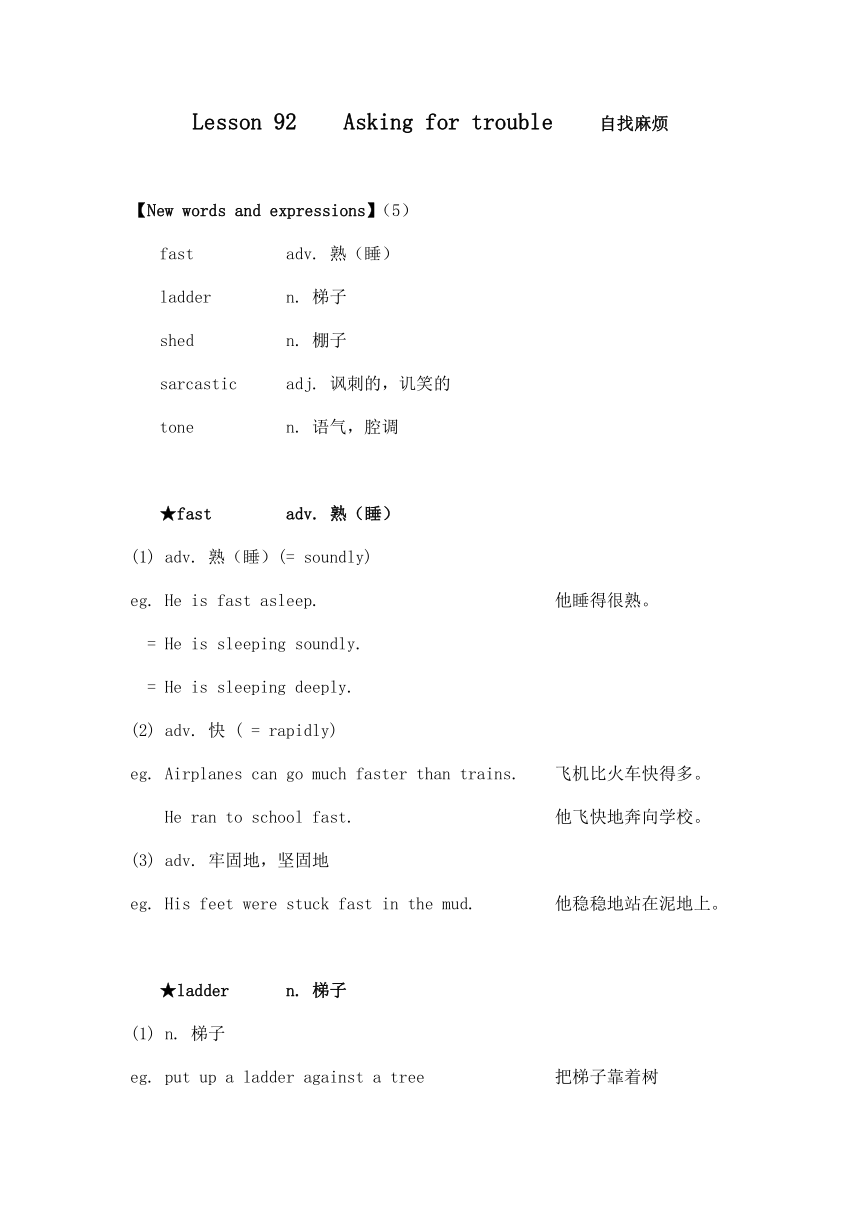 | |
| 格式 | docx | ||
| 文件大小 | 25.8KB | ||
| 资源类型 | 教案 | ||
| 版本资源 | 新概念英语 | ||
| 科目 | 英语 | ||
| 更新时间 | 2023-09-26 06:49:31 | ||
图片预览

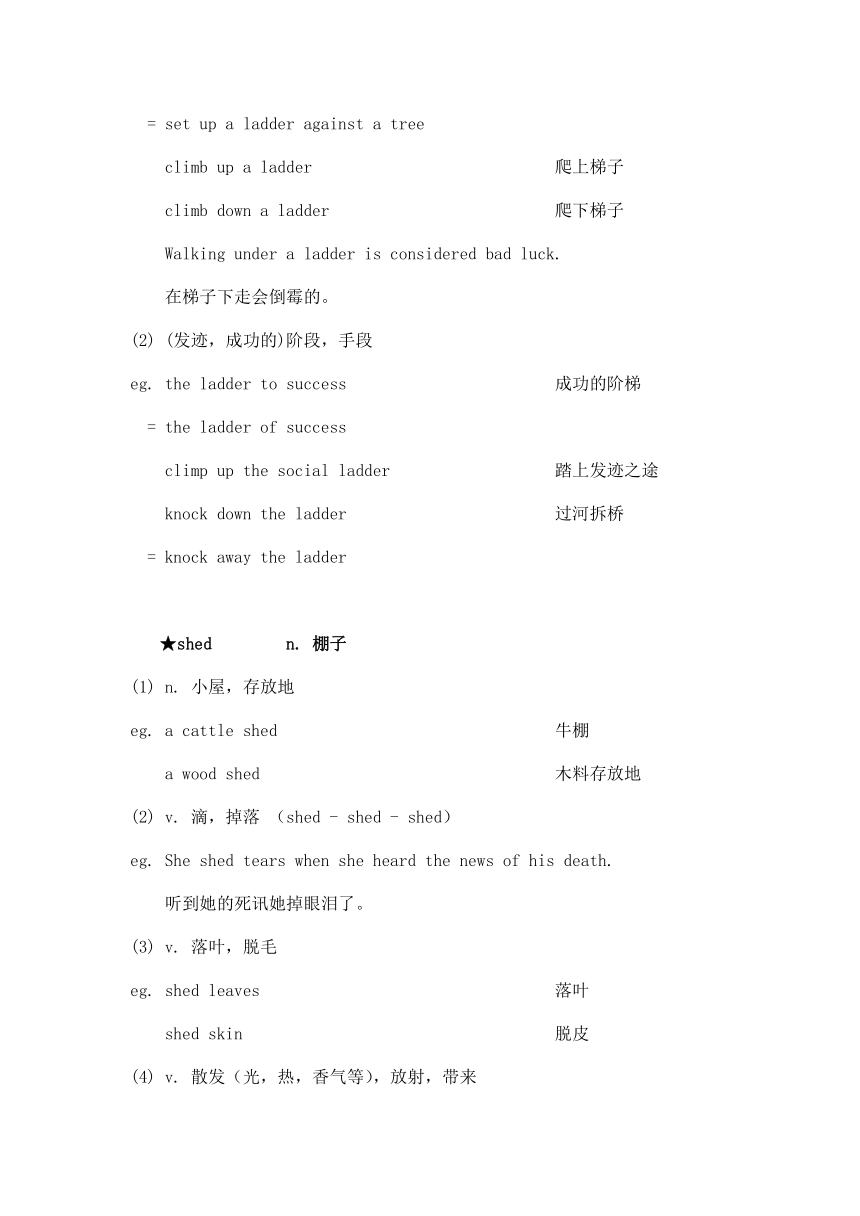
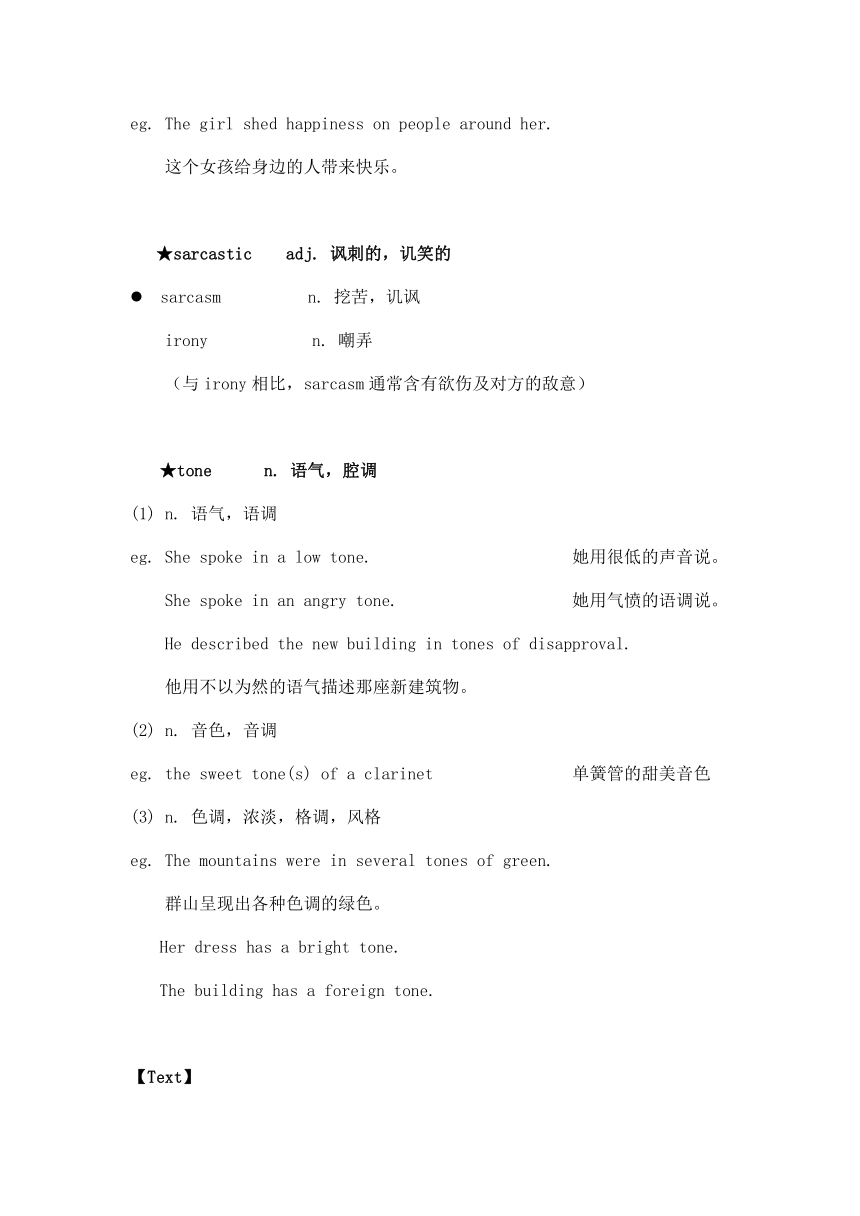
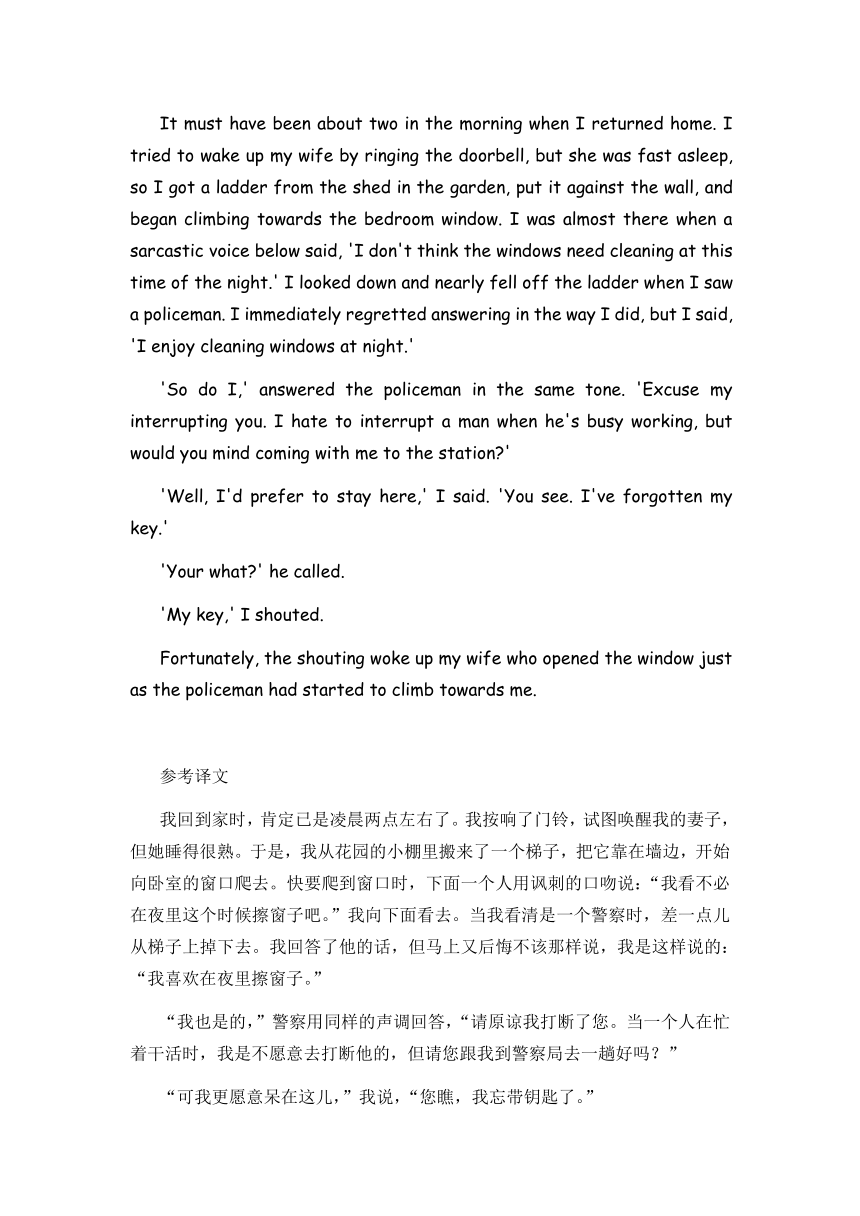
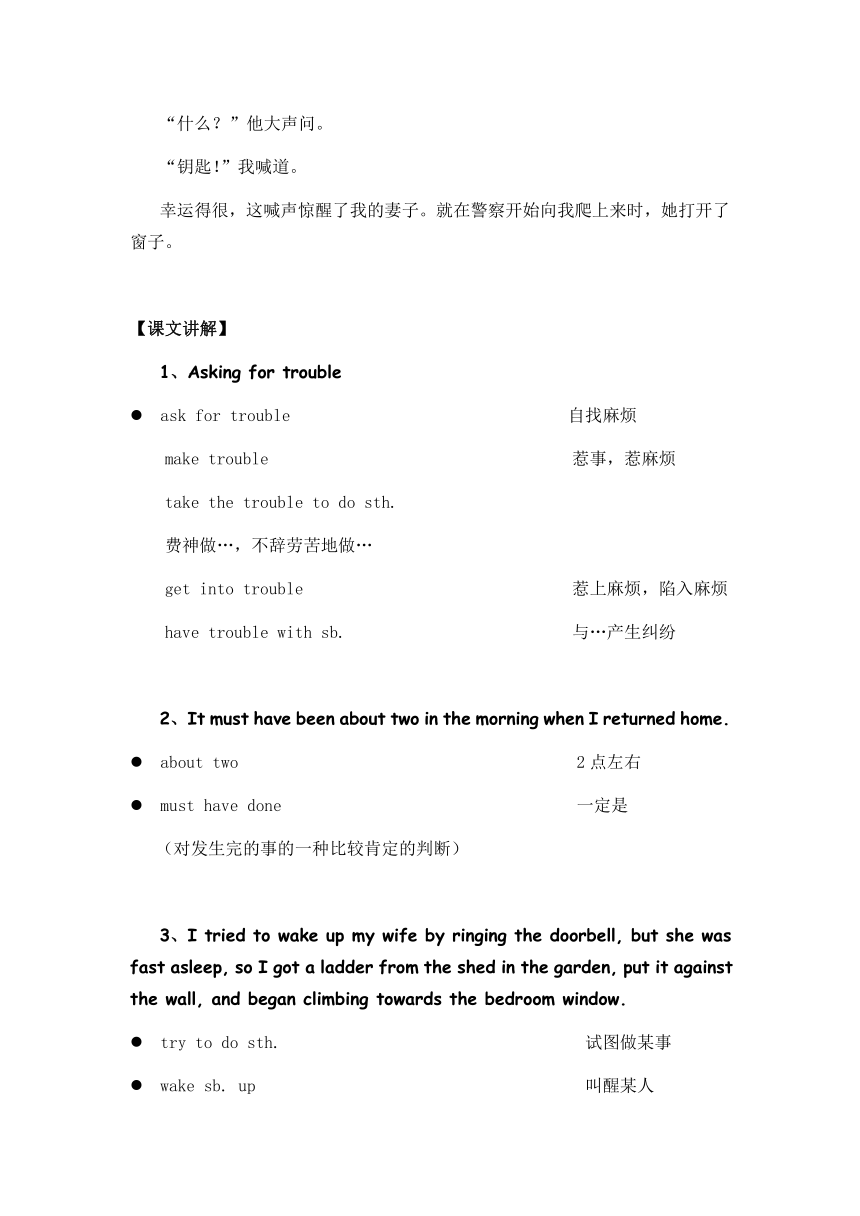
文档简介
Lesson 92 Asking for trouble 自找麻烦
【New words and expressions】(5)
fast adv. 熟(睡)
ladder n. 梯子
shed n. 棚子
sarcastic adj. 讽刺的,讥笑的
tone n. 语气,腔调
★fast adv. 熟(睡)
adv. 熟(睡)(= soundly)
eg. He is fast asleep. 他睡得很熟。
= He is sleeping soundly.
= He is sleeping deeply.
adv. 快 ( = rapidly)
eg. Airplanes can go much faster than trains. 飞机比火车快得多。
He ran to school fast. 他飞快地奔向学校。
adv. 牢固地,坚固地
eg. His feet were stuck fast in the mud. 他稳稳地站在泥地上。
★ladder n. 梯子
n. 梯子
eg. put up a ladder against a tree 把梯子靠着树
= set up a ladder against a tree
climb up a ladder 爬上梯子
climb down a ladder 爬下梯子
Walking under a ladder is considered bad luck.
在梯子下走会倒霉的。
(发迹,成功的)阶段,手段
eg. the ladder to success 成功的阶梯
= the ladder of success
climp up the social ladder 踏上发迹之途
knock down the ladder 过河拆桥
= knock away the ladder
★shed n. 棚子
n. 小屋,存放地
eg. a cattle shed 牛棚
a wood shed 木料存放地
v. 滴,掉落 (shed - shed - shed)
eg. She shed tears when she heard the news of his death.
听到她的死讯她掉眼泪了。
v. 落叶,脱毛
eg. shed leaves 落叶
shed skin 脱皮
v. 散发(光,热,香气等),放射,带来
eg. The girl shed happiness on people around her.
这个女孩给身边的人带来快乐。
★sarcastic adj. 讽刺的,讥笑的
sarcasm n. 挖苦,讥讽
irony n. 嘲弄
(与irony相比,sarcasm通常含有欲伤及对方的敌意)
★tone n. 语气,腔调
n. 语气,语调
eg. She spoke in a low tone. 她用很低的声音说。
She spoke in an angry tone. 她用气愤的语调说。
He described the new building in tones of disapproval.
他用不以为然的语气描述那座新建筑物。
n. 音色,音调
eg. the sweet tone(s) of a clarinet 单簧管的甜美音色
n. 色调,浓淡,格调,风格
eg. The mountains were in several tones of green.
群山呈现出各种色调的绿色。
Her dress has a bright tone.
The building has a foreign tone.
【Text】
It must have been about two in the morning when I returned home. I tried to wake up my wife by ringing the doorbell, but she was fast asleep, so I got a ladder from the shed in the garden, put it against the wall, and began climbing towards the bedroom window. I was almost there when a sarcastic voice below said, 'I don't think the windows need cleaning at this time of the night.' I looked down and nearly fell off the ladder when I saw a policeman. I immediately regretted answering in the way I did, but I said, 'I enjoy cleaning windows at night.'
'So do I,' answered the policeman in the same tone. 'Excuse my interrupting you. I hate to interrupt a man when he's busy working, but would you mind coming with me to the station '
'Well, I'd prefer to stay here,' I said. 'You see. I've forgotten my key.'
'Your what ' he called.
'My key,' I shouted.
Fortunately, the shouting woke up my wife who opened the window just as the policeman had started to climb towards me.
参考译文
我回到家时,肯定已是凌晨两点左右了。我按响了门铃,试图唤醒我的妻子,但她睡得很熟。于是,我从花园的小棚里搬来了一个梯子,把它靠在墙边,开始向卧室的窗口爬去。快要爬到窗口时,下面一个人用讽刺的口吻说:“我看不必在夜里这个时候擦窗子吧。”我向下面看去。当我看清是一个警察时,差一点儿从梯子上掉下去。我回答了他的话,但马上又后悔不该那样说,我是这样说的:“我喜欢在夜里擦窗子。”
“我也是的,”警察用同样的声调回答,“请原谅我打断了您。当一个人在忙着干活时,我是不愿意去打断他的,但请您跟我到警察局去一趟好吗?”
“可我更愿意呆在这儿,”我说,“您瞧,我忘带钥匙了。”
“什么?”他大声问。
“钥匙!”我喊道。
幸运得很,这喊声惊醒了我的妻子。就在警察开始向我爬上来时,她打开了窗子。
【课文讲解】
1、Asking for trouble
ask for trouble 自找麻烦
make trouble 惹事,惹麻烦
take the trouble to do sth.
费神做…,不辞劳苦地做…
get into trouble 惹上麻烦,陷入麻烦
have trouble with sb. 与…产生纠纷
It must have been about two in the morning when I returned home.
about two 2点左右
must have done 一定是
(对发生完的事的一种比较肯定的判断)
I tried to wake up my wife by ringing the doorbell, but she was fast asleep, so I got a ladder from the shed in the garden, put it against the wall, and began climbing towards the bedroom window.
try to do sth. 试图做某事
wake sb. up 叫醒某人
= wake up sb. = awake sb. = sb. be woken up
wake up to 觉醒
eg. At last they woke up to the seriousness of the situation.
他们终于觉悟到事态的严重性。
be awake 清醒的
ring the doorbell 按响门铃
bedroom 卧室
sitting-room 起居室
= living-room
bath room 卫生间
I was almost there when a sarcastic voice below said, I don't think the windows need cleaning at this time of the night.
有些动词如think,believe,expect,suppose等后接表示否定意思的宾语从句时,通常在主句中使用否定形式,但译成汉语时否定意义仍在宾语从句中。
need doing sth. 需要做某事
(need表示“需要”时,后面接动名词有被动的含义。)
need cleaning = need to be cleaned
eg. The classroom needs cleaning. 教室需要打扫。
The shirt needs ironing. 衬衫需要熨烫。
at this time of the night 夜里这个时候
I looked down and nearly fell off the ladder when I saw a policeman.
fell off the ladder 从梯子上掉了下去。
6、I immediately regretted answering in the way I did, but I said, 'I enjoy cleaning windows at night.'
regret doing sth. 后悔做了某事(对已发生的事情表示后悔)
regret to do sth. 遗憾要做某事(对现在要发生的事表示抱歉)
in the way I did中I did 作定语从句,修饰the way
enjoy cleaning windows 喜欢擦窗子
enjoy doing sth. 喜欢做某事
eg. I enjoy sitting in a boat and doing nothing at all.
我喜欢坐在船上什么也不做。
'So do I,' answered the policeman in the same tone. 'Excuse my interrupting you. I hate to interrupt a man when he's busy working, but would you mind coming with me to the station '
So do I. 当前面一句话的谓语也适用后一句时,可用so(肯定)或neither(否定)开头,后面接倒装语序。
eg. He reads a lot and so do I.
他书读得很多,我也是。
He doesn’t read much and neither do I.
他书读得不多,我也是。
He can swim and so can I.
他会游泳,我也会。
He can’t swim and neither can I.
他不会游泳,我也不会。
excuse v. 原谅
excuse sb. for doing sth. 原谅某人做某事
= excuse one’s doing sth.
eg. She excused him for being late. 她原谅他迟到了
= She excused his being late.
hate to do sth. 不喜欢做某事
= hate doing sth.
(hate to do表示目前这一次不想做某事;
hate doing不喜欢做某事,是一直喜好。)
eg. I hate to disturb you, but may I come in
我不想打扰你,但是我能进来吗?
I hate disturbing people when they are busy.
当别人忙的时候,我不喜欢去打扰别人。
hate to do / hate doing 不愿意,不想做
eg. I hate to say it, but you are mistaken.
我很不想说这句话,但你的确是弄错了。
be busy doing sth. 忙于做某事
would you mind doing sth. 你是否介意做某事
would you mind one’s doing sth. 你是否介意某人做某事
eg. Would you mind opening the window 你去把窗子打开好吗?
Would you mind my opening the window 我开窗你介意吗?
8、'Well, I'd prefer to stay here,' I said. 'You see. I've forgotten my key.'
'Your what ' he called.
'My key,' I shouted.
prefer to do sth. 更愿意做某事
prefer to go to the movies 更愿意看电影
prefer not to do 更愿意不做某事
eg. I’d prefer not to go there. 我更愿意不去那儿。
prefer to do + rather than (to) do 宁愿…而不愿
eg. I prefer to go to the movies rather than (to) stay home.
我更愿意看电影而不是呆在家里。
= I prefer going to the movies to staying home.
prefer + sb. + to do sth. 宁可让某人做某事
eg. They preferred their son to go to college.
他们宁可让儿子上大学。
9、Fortunately, the shouting woke up my wife who opened the window just as the policeman had started to climb towards me.
the shouting woke up my wife who opened the window
这喊声惊醒了我的妻子
其中,who引导定语从句修饰my wife
【Key Structures】
动名词的用法:v-ing(L:20,44,68)
在句中作主语,宾语,表语,定语。
eg. Eating is always a pleasure.
吃总是一种享受。(动名词作主语)
I hate telling lies.
我讨厌说话。(动名词短语作宾语)
His job is keeping the hall clean.
他的工作是保持大厅整洁。(动名词短语作表语)
a swimming pool 游泳池(动名词作定语)
(动名词作定语时通常表达某种功能。)
【Special Difficulties】
用于并列补充句和反应句的so和neither/nor
so和neither/nor用于并列补充句和表示反应的句子时表示“也,同样”,so用于肯定句,neither/nor用于否定句。它们后面跟的是省略形式的分句,只有助动词+主语,也可以是情态助动词+主语:
John can speak French and so can I.
I didn’t got to the meeting last night.
Neither/Nor did I.
You shouldn’t work so hard and nor should I.
【Summary Writing】
The writer returned home at about two in the morning and rang the doorbell. Having failed to wake up his wife, he put a ladder against the wall and began climbing towards the bedroom window. Suddenly a policeman called out, but the writer answered him rudely. He told him he had forgotten his key. The shouting woke his wife. She opened the window just as the policeman had started climbing the ladder after him. (74 words)
On arriving home at about two in the morning, the writer rang the doorbell but failed to wake up his wife. After having put a ladder against the wall, he was climbing towards the bedroom window when a policeman called out. Answering him rudely, the writer told him he had forgotten his key. The shouting woke his wife, who opened the window at the moment when the policeman started climbing the ladder after him. (74 words)
【New words and expressions】(5)
fast adv. 熟(睡)
ladder n. 梯子
shed n. 棚子
sarcastic adj. 讽刺的,讥笑的
tone n. 语气,腔调
★fast adv. 熟(睡)
adv. 熟(睡)(= soundly)
eg. He is fast asleep. 他睡得很熟。
= He is sleeping soundly.
= He is sleeping deeply.
adv. 快 ( = rapidly)
eg. Airplanes can go much faster than trains. 飞机比火车快得多。
He ran to school fast. 他飞快地奔向学校。
adv. 牢固地,坚固地
eg. His feet were stuck fast in the mud. 他稳稳地站在泥地上。
★ladder n. 梯子
n. 梯子
eg. put up a ladder against a tree 把梯子靠着树
= set up a ladder against a tree
climb up a ladder 爬上梯子
climb down a ladder 爬下梯子
Walking under a ladder is considered bad luck.
在梯子下走会倒霉的。
(发迹,成功的)阶段,手段
eg. the ladder to success 成功的阶梯
= the ladder of success
climp up the social ladder 踏上发迹之途
knock down the ladder 过河拆桥
= knock away the ladder
★shed n. 棚子
n. 小屋,存放地
eg. a cattle shed 牛棚
a wood shed 木料存放地
v. 滴,掉落 (shed - shed - shed)
eg. She shed tears when she heard the news of his death.
听到她的死讯她掉眼泪了。
v. 落叶,脱毛
eg. shed leaves 落叶
shed skin 脱皮
v. 散发(光,热,香气等),放射,带来
eg. The girl shed happiness on people around her.
这个女孩给身边的人带来快乐。
★sarcastic adj. 讽刺的,讥笑的
sarcasm n. 挖苦,讥讽
irony n. 嘲弄
(与irony相比,sarcasm通常含有欲伤及对方的敌意)
★tone n. 语气,腔调
n. 语气,语调
eg. She spoke in a low tone. 她用很低的声音说。
She spoke in an angry tone. 她用气愤的语调说。
He described the new building in tones of disapproval.
他用不以为然的语气描述那座新建筑物。
n. 音色,音调
eg. the sweet tone(s) of a clarinet 单簧管的甜美音色
n. 色调,浓淡,格调,风格
eg. The mountains were in several tones of green.
群山呈现出各种色调的绿色。
Her dress has a bright tone.
The building has a foreign tone.
【Text】
It must have been about two in the morning when I returned home. I tried to wake up my wife by ringing the doorbell, but she was fast asleep, so I got a ladder from the shed in the garden, put it against the wall, and began climbing towards the bedroom window. I was almost there when a sarcastic voice below said, 'I don't think the windows need cleaning at this time of the night.' I looked down and nearly fell off the ladder when I saw a policeman. I immediately regretted answering in the way I did, but I said, 'I enjoy cleaning windows at night.'
'So do I,' answered the policeman in the same tone. 'Excuse my interrupting you. I hate to interrupt a man when he's busy working, but would you mind coming with me to the station '
'Well, I'd prefer to stay here,' I said. 'You see. I've forgotten my key.'
'Your what ' he called.
'My key,' I shouted.
Fortunately, the shouting woke up my wife who opened the window just as the policeman had started to climb towards me.
参考译文
我回到家时,肯定已是凌晨两点左右了。我按响了门铃,试图唤醒我的妻子,但她睡得很熟。于是,我从花园的小棚里搬来了一个梯子,把它靠在墙边,开始向卧室的窗口爬去。快要爬到窗口时,下面一个人用讽刺的口吻说:“我看不必在夜里这个时候擦窗子吧。”我向下面看去。当我看清是一个警察时,差一点儿从梯子上掉下去。我回答了他的话,但马上又后悔不该那样说,我是这样说的:“我喜欢在夜里擦窗子。”
“我也是的,”警察用同样的声调回答,“请原谅我打断了您。当一个人在忙着干活时,我是不愿意去打断他的,但请您跟我到警察局去一趟好吗?”
“可我更愿意呆在这儿,”我说,“您瞧,我忘带钥匙了。”
“什么?”他大声问。
“钥匙!”我喊道。
幸运得很,这喊声惊醒了我的妻子。就在警察开始向我爬上来时,她打开了窗子。
【课文讲解】
1、Asking for trouble
ask for trouble 自找麻烦
make trouble 惹事,惹麻烦
take the trouble to do sth.
费神做…,不辞劳苦地做…
get into trouble 惹上麻烦,陷入麻烦
have trouble with sb. 与…产生纠纷
It must have been about two in the morning when I returned home.
about two 2点左右
must have done 一定是
(对发生完的事的一种比较肯定的判断)
I tried to wake up my wife by ringing the doorbell, but she was fast asleep, so I got a ladder from the shed in the garden, put it against the wall, and began climbing towards the bedroom window.
try to do sth. 试图做某事
wake sb. up 叫醒某人
= wake up sb. = awake sb. = sb. be woken up
wake up to 觉醒
eg. At last they woke up to the seriousness of the situation.
他们终于觉悟到事态的严重性。
be awake 清醒的
ring the doorbell 按响门铃
bedroom 卧室
sitting-room 起居室
= living-room
bath room 卫生间
I was almost there when a sarcastic voice below said, I don't think the windows need cleaning at this time of the night.
有些动词如think,believe,expect,suppose等后接表示否定意思的宾语从句时,通常在主句中使用否定形式,但译成汉语时否定意义仍在宾语从句中。
need doing sth. 需要做某事
(need表示“需要”时,后面接动名词有被动的含义。)
need cleaning = need to be cleaned
eg. The classroom needs cleaning. 教室需要打扫。
The shirt needs ironing. 衬衫需要熨烫。
at this time of the night 夜里这个时候
I looked down and nearly fell off the ladder when I saw a policeman.
fell off the ladder 从梯子上掉了下去。
6、I immediately regretted answering in the way I did, but I said, 'I enjoy cleaning windows at night.'
regret doing sth. 后悔做了某事(对已发生的事情表示后悔)
regret to do sth. 遗憾要做某事(对现在要发生的事表示抱歉)
in the way I did中I did 作定语从句,修饰the way
enjoy cleaning windows 喜欢擦窗子
enjoy doing sth. 喜欢做某事
eg. I enjoy sitting in a boat and doing nothing at all.
我喜欢坐在船上什么也不做。
'So do I,' answered the policeman in the same tone. 'Excuse my interrupting you. I hate to interrupt a man when he's busy working, but would you mind coming with me to the station '
So do I. 当前面一句话的谓语也适用后一句时,可用so(肯定)或neither(否定)开头,后面接倒装语序。
eg. He reads a lot and so do I.
他书读得很多,我也是。
He doesn’t read much and neither do I.
他书读得不多,我也是。
He can swim and so can I.
他会游泳,我也会。
He can’t swim and neither can I.
他不会游泳,我也不会。
excuse v. 原谅
excuse sb. for doing sth. 原谅某人做某事
= excuse one’s doing sth.
eg. She excused him for being late. 她原谅他迟到了
= She excused his being late.
hate to do sth. 不喜欢做某事
= hate doing sth.
(hate to do表示目前这一次不想做某事;
hate doing不喜欢做某事,是一直喜好。)
eg. I hate to disturb you, but may I come in
我不想打扰你,但是我能进来吗?
I hate disturbing people when they are busy.
当别人忙的时候,我不喜欢去打扰别人。
hate to do / hate doing 不愿意,不想做
eg. I hate to say it, but you are mistaken.
我很不想说这句话,但你的确是弄错了。
be busy doing sth. 忙于做某事
would you mind doing sth. 你是否介意做某事
would you mind one’s doing sth. 你是否介意某人做某事
eg. Would you mind opening the window 你去把窗子打开好吗?
Would you mind my opening the window 我开窗你介意吗?
8、'Well, I'd prefer to stay here,' I said. 'You see. I've forgotten my key.'
'Your what ' he called.
'My key,' I shouted.
prefer to do sth. 更愿意做某事
prefer to go to the movies 更愿意看电影
prefer not to do 更愿意不做某事
eg. I’d prefer not to go there. 我更愿意不去那儿。
prefer to do + rather than (to) do 宁愿…而不愿
eg. I prefer to go to the movies rather than (to) stay home.
我更愿意看电影而不是呆在家里。
= I prefer going to the movies to staying home.
prefer + sb. + to do sth. 宁可让某人做某事
eg. They preferred their son to go to college.
他们宁可让儿子上大学。
9、Fortunately, the shouting woke up my wife who opened the window just as the policeman had started to climb towards me.
the shouting woke up my wife who opened the window
这喊声惊醒了我的妻子
其中,who引导定语从句修饰my wife
【Key Structures】
动名词的用法:v-ing(L:20,44,68)
在句中作主语,宾语,表语,定语。
eg. Eating is always a pleasure.
吃总是一种享受。(动名词作主语)
I hate telling lies.
我讨厌说话。(动名词短语作宾语)
His job is keeping the hall clean.
他的工作是保持大厅整洁。(动名词短语作表语)
a swimming pool 游泳池(动名词作定语)
(动名词作定语时通常表达某种功能。)
【Special Difficulties】
用于并列补充句和反应句的so和neither/nor
so和neither/nor用于并列补充句和表示反应的句子时表示“也,同样”,so用于肯定句,neither/nor用于否定句。它们后面跟的是省略形式的分句,只有助动词+主语,也可以是情态助动词+主语:
John can speak French and so can I.
I didn’t got to the meeting last night.
Neither/Nor did I.
You shouldn’t work so hard and nor should I.
【Summary Writing】
The writer returned home at about two in the morning and rang the doorbell. Having failed to wake up his wife, he put a ladder against the wall and began climbing towards the bedroom window. Suddenly a policeman called out, but the writer answered him rudely. He told him he had forgotten his key. The shouting woke his wife. She opened the window just as the policeman had started climbing the ladder after him. (74 words)
On arriving home at about two in the morning, the writer rang the doorbell but failed to wake up his wife. After having put a ladder against the wall, he was climbing towards the bedroom window when a policeman called out. Answering him rudely, the writer told him he had forgotten his key. The shouting woke his wife, who opened the window at the moment when the policeman started climbing the ladder after him. (74 words)
同课章节目录
